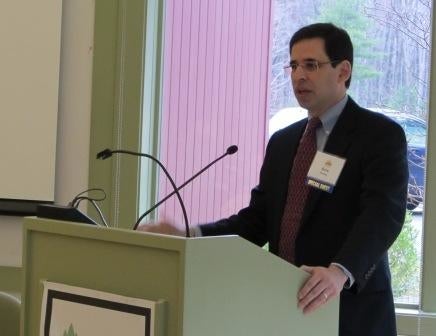Home sales remain weak and the future outlook for the real estate sector is muddy, according to Eric Belsky, managing director of Harvard University’s Joint Center for Housing Studies, who spoke Tuesday morning in Leominster.
Belsky gave his sobering snapshot of the market during a forum sponsored by the North Central Massachusetts Neighborworks Homeownership Center, a coalition of five community development organizations in Northern Worcester County.
“I can’t be very cheerful about where we are in the housing market,” Belsky said.
In 2011, the housing market got off to a “very weak start,” he noted. While springtime has traditionally been a strong buying period, Belsky is taking a wait-and-see approach.
There have been only “minimal signs of improvement” in the housing market in the past few years, he said, despite some positive signs in the national economy, including gross domestic product growth, job gains and consumer confidence rising.
National new home sales in February hit a record low, Belsky said, citing U.S. Department of Commerce figures. Existing home sales were below 5 million nationally that month, a 10 percent drop year-over-year. Single-family home sales were down 12 percent during the same time period, he said.
The housing market is marred with deflated prices and weak demand, he said.
To improve the market, Belsky said there needs to be strong, robust job growth over a sustained period of time.
Local Impact
The recovery will continue to be especially difficult for areas such as North Central Massachusetts, which have been hit harder by the foreclosure crisis compared to other areas of the state.
While before the recession there were “ridiculously loose and lax” lending standards, Belsky said now low- and moderate-income residents are having trouble getting financing because lending standards may be too restrictive.
In the past, one solution has been for organizations like the Twin Cities Community Development Corp., which is a member of the Neighborworks coalition, to turn foreclosed properties into rental units. To do that, however, organizations like the CDC use low-income tax credits. The value of those, Belsky noted, have also dropped, making rental solutions difficult to finance.
During a panel discussion after Belsky’s speech, Robert Hubbard, executive director of the Gardner Redevelopment Authority said he’s worried about cutbacks at the federal level for community development block grants and other assistance programs.
Leominster Credit Union President and CEO Gordon Edmonds said as a community bank it is his organization’s mission to help homeowners find housing solutions. But, he said, the bank has to be stringent in its analysis of borrowers to insure that mortgages can be repaid.
Fitchburg Mayor Lisa Wong also participated in the panel discussion.

